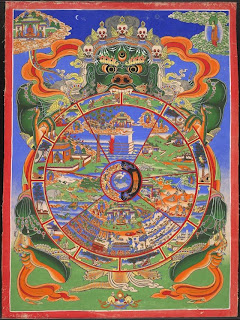 Next week I'm attending a symposium at the Royal Society on the origin of time and the universe, in honour of Michael Heller's 2008 Templeton Prize. There'll be talks by Michael himself, John Barrow, Andreas Doring, Paul Tod, and Shahn Majid. Majid proposed some years ago that the mathematical concept of self-duality can be used to provide an ultimate explanation of the universe in terms of the universe itself; a type of self-explanation. Michael Heller wrote a lovely paper on Majid's ideas, (Algebraic self-daulity as the 'ultimate explanation', Foundations of Science, Vol. 9, pp369-385) in 2004, and I've been reviewing this ahead of next week's symposium.
Next week I'm attending a symposium at the Royal Society on the origin of time and the universe, in honour of Michael Heller's 2008 Templeton Prize. There'll be talks by Michael himself, John Barrow, Andreas Doring, Paul Tod, and Shahn Majid. Majid proposed some years ago that the mathematical concept of self-duality can be used to provide an ultimate explanation of the universe in terms of the universe itself; a type of self-explanation. Michael Heller wrote a lovely paper on Majid's ideas, (Algebraic self-daulity as the 'ultimate explanation', Foundations of Science, Vol. 9, pp369-385) in 2004, and I've been reviewing this ahead of next week's symposium.Majid illustrates his idea with the notion of a self-dual bicrossproduct Hopf algebra, (although he doesn't believe that this specific mathematical structure is a candidate for a theory of everything). To understand what this is, we first need to understand what a Hopf algebra is.
An algebra is a structure which possesses both the addition operation '+' of a vector space over a number field K, and a product operation '⋅'. An algebra is unital if there is a mapping η:K → H. A bialgebra possesses both the structure of an associative unital algebra (H,+,⋅,η,K), and the structure of a coalgebra (H,+,Δ,ε,K), where Δ:H → H × H is the coproduct, and ε:H → K is the counit. Given an algebra or coalgebra A, the dual A* is defined to be set of linear functionals on φ: A → K. The dual of an algebra is a natural colagebra, and the dual of a coalgebra is a natural algebra, hence a bialgebra possesses within itself the dual of both its algebra and coalgebra. A Hopf algebra H is a bialgebra equipped with an special map S:H → H called the antipode map.
Now, suppose that H and A are both Hopf algebras, and suppose that there is a left-action of H on A, and a right-coaction on A on H. This means that there is a mapping α: H × A → A, and a mapping β: H → H × A, respectively. One can then form something called the cross-product H ♦ A, which will also be a Hopf algebra. This cross-product has a dual cross-product, and the combination of the two cross-products provides the structure of a bicrossproduct Hopf algebra.
The dual of this bicrossproduct gives another bicrossproduct, but with H exchanged for the dual A*, and with A exchanged for H*. Thus, if H is isomorphic to A* (and A isomorphic to H*), then one has a self-dual bicrossproduct Hopf algebra.
Majid's proposal is that such a structure is self-explaining, in the sense, I think, that the A-part explains the H-part, the H-part explains the A-part, the whole thing H ♦ A is explained by either H or A, and either H or A is explained by H ♦ A. It's a type of Yin-Yang idea.
Now, this is fascinating stuff, but I think the overall objective of seeking a self-explaining universe, is doomed to failure. Suppose, for the sake of illustration, that our universe were a self-dual bicrossproduct Hopf algebra. This would not eliminate the question of contingency. One could still ask: why does this particular self-dual bicrossproduct Hopf algebra physically exist, and not one of the many other self-dual bicrossproduct Hopf algebras? The question is only eliminated if one proposes that our universe is an object in a mathematical category containing only one object. Even then, however, the problem of contingency is merely shifted, and one can pose the question: why is our universe an object in this mathematical category rather than an object in one of the many other mathematical categories? 'Why is the universe not a topos, or a highly structured pseudo-Riemannian manifold?' one could ask.
Ultimately, I think, one has to adopt Max Tegmark's proposal that all mathematical structures physically exist. There is, one can propose, only one type of existence: absence of contradiction. What we deem the physical universe is simply one particular mathematical structure, which exists by virtue of being free from contradiction. All other mathematical structures exist, but only those containing cognitive self-aware substructures possess observers capable of asking what the mathematical structure of their universe is.





